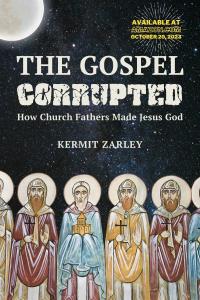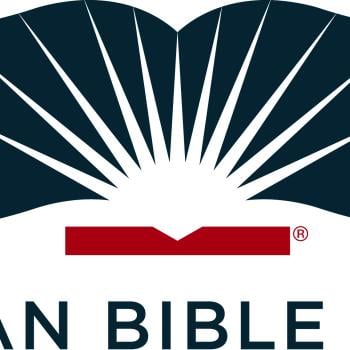My tenth theological book is on track to be self-published in about ten days and be available on amazon.com. It is entitled The Gospel Corrupted: How Church Fathers Made Jesus God. The subtitle echoes titles of two important books in this genre: Richard Rubenstein’s When Jesus Became God and Bart Ehrman’s How Jesus Became God. Most historians of early Christianity, New Testament exegetes, and historical-critical scholars of the New Testament agree that the Synoptic Gospels (Matthew, Mark, and Luke) do not say Jesus is God, but the Gospel of John does. This interpretation represents a very significant change within the Bible about the identity of Jesus. It has been the standard interpretation throughout post-apostolic Christianity. I maintain that this change did occur in the history of Christianity but that it was later, during the patristic era and therefore is not in the New Testament. Thus, I do not think the Gospel of John identifies Jesus as God. I believe that the historic interpretation that Jesus is God in the Gospel of John is a huge mistake.
This book, The Gospel Corrupted, is only about 100+ pages in length. I intend it as a primer for my big book The Restitution: Biblical Proof Jesus Is NOT God. It is 570 pages with many reference footnotes citing the works of over 400 scholars. This book is an in-depth study of the Bible’s critical texts on whether Jesus is God.
In contrast, The Gospel Corrupted is a very easy read, thus a little more accessible. I’m expecting some customers may want to purchase several of these books to give out to relatives and friends. I’m expecting the retail price to be about $7. I may sell discounted boxes of ten of them on my kermitzarley.com website. I will post an alert on my blog and on my website when this book is available at amazon.com.
The thesis of The Gospel Corrupted is that post-first century church fathers erred by interpreting that the New Testament, especially the Gospel of John, identifies Jesus as God. However, “the quest for the historical Jesus” has been the most in-depth, scholarly investigation of the Bible for about the past 200 years, and it appears that this quest is going into a so-called Fourth Quest. It is solely a further examination of the New Testament’s Gospel of John from the perspective that maybe interpreters have been misunderstanding this gospel all along and that it doesn’t really identify Jesus as God. That is my position in my book The Restitution, wherein I devote 100 pages to interpreting critical texts in the Gospel of John.
The Gospel Corrupted begins as a letter to church fathers saying, “I have a complaint against some of you.” This letter concept emerges occasionally throughout the book. It is somewhat reminiscent of Martin Luther’s “Ninety-five Theses.”
In Chapter 1, I then tell my story of how I was a Trinitarian Christian for twenty-two years and then had what I call “a moment of enlightenment” while reading Jesus’s statement in his Olivet Discourse in which he said to his apostles that he did not know the time of his second coming (Matthew 24.36; Mark 13.32). That changed my life forever by throwing me into a massive study about whether Jesus is God as I and most Christians had been taught. I estimate that in the next twenty-eight years I read about a thousand books on the identity of Jesus and scoured thousands of Bible commentaries in libraries, examining the most critical texts about this subject. The result was the publishing of my book, The Restitution.
In Chapter 2 of The Gospel Corrupted, I examine “the gospel” (Gr. euangelion) in the New Testament (NT) writings as to what it means, which is “good news,” and what it is. I conclude that it is as follows: Jesus Christ is Lord who died for our sins and arose from the dead. Simple as that.
Chapter 3 is entitled “The Gospel According to Church Fathers.” I relate how church fathers developed their Christology in three stages. First, the apologists of the 2nd and 3rd centuries said Jesus is God, but to a lesser extent than God the Father is, whom they identified exclusively as “God Almighty.” But they never demanded that Christians believe Jesus is God to be saved and thus become a real Christian.
Second, at the Nicene Council of 325, those bishops determined that Jesus was in every way equal in divinity to God the Father. To indicate this they put in their Nicene Creed that Jesus is “very God from very God.” Plus, they said in this creed that people must believe this or they are not Christians and thus are condemned. Interestingly, they never said how this affects Christians who lived before them who had never been taught this. When these Nicene church fathers did this, I allege that they changed the gospel and thereby corrupted it.
Third, at the Council of Constantinople, in 381, church fathers made official their so-called “doctrine of the Trinity” without using the word “Trinity” in their creed. They required that people must believe this to be saved. This “doctrine of the Trinity” can be defined in English as follows: God is one essence existing as three co-equal and co-eternal Persons: Father, Son (Jesus Christ), and Holy Spirit. I maintain that none of this can be supported from the Bible.
Chapter 4 is about how the Synoptic Gospels (Matthew, Mark, and Luke) present “the gospel.” And I relate a confusion that exists in church history concerning this word “gospel.” It is that the word euangelion in the Greek texts of these books means the “good news” that Jesus proclaimed about the kingdom of God. But about 150 years later church fathers attached titles to this books by calling them “gospels,” thus referring the books of Matthew, Mark, and Luke. Thus, “gospel” in the Synoptic is that which was proclaimed whereas attaching this word to books came to mean that which was written. I believe a distinction needs to made here to avoid confusion.
The most powerful chapter of this book, which affirms my thesis that the NT does not say Jesus is God and that church fathers corrupted the gospel by later demanding that it does, is Chapter 6 entitled “The Gospel According to the Book of Acts.” The Acts of the Apostles is the fifth book of the NT. It relates the mission of the early church in spreading the gospel. It consists of twenty-four evangelistic messages, and none of them say Jesus is God. Rather, they say seventeen times that God raised Jesus from the dead. I insist that is the core message of the gospel that the early followers of Jesus proclaimed which “turned the world upside down.”
Chapter 8 is about whether church fathers were divinely authorized to change the gospel. It is also about whether belief that Jesus is God evolved in the church or was developed from what was already there when it was first proclaimed.
Chapter 9 is about how the church doctrine of the Trinity hinders dialogue between the three monotheistic religions of the world: Judaism, Christianity, and Islam.
The last chapter, Chapter 10, is speculation about whether Nicene church fathers and others will be held accountable for their error in making Jesus God and God as three Persons. I employ a few golf metaphors to lighten things up a little as I relate what I think might occur at the judgment.














